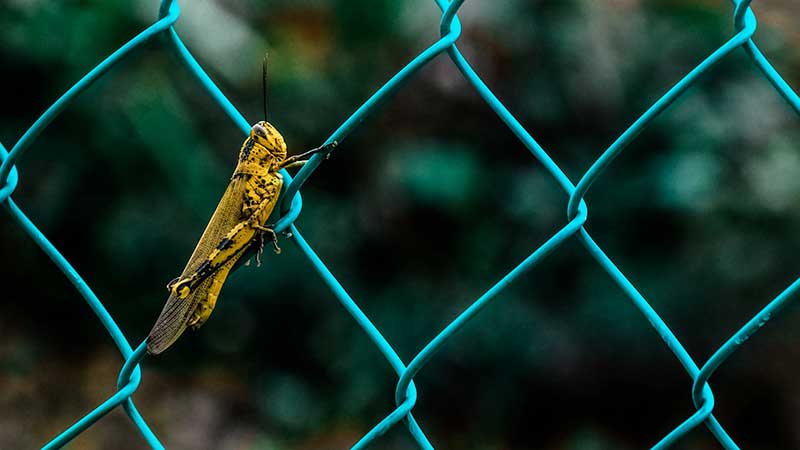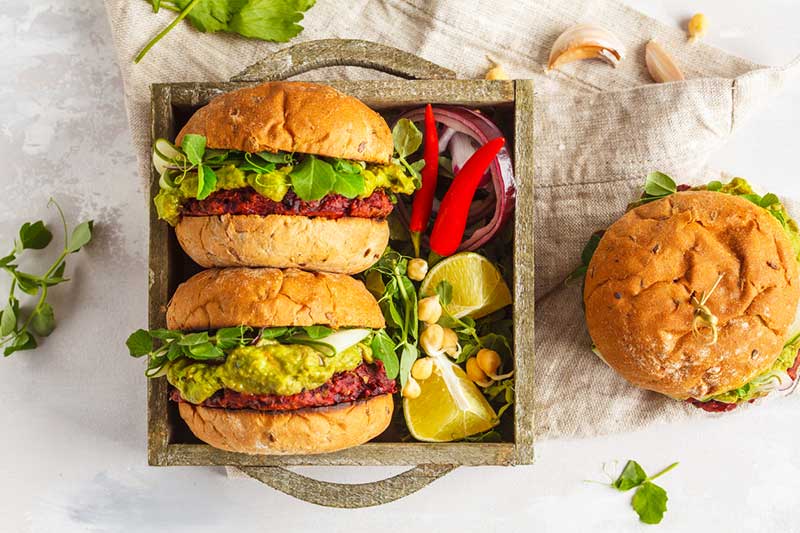Should we eat insects to save the world? We all know that resource-intensive factory farming of cows, pigs, chickens and many other "farm animals" causes massive animal suffering and is a very decisive factor in the greatest Environmental problems of our time contributes.
Our diet therefore needs to change. More and more people are therefore consuming insect burgers, insect pasta, as well as seasoned snacks and energy bars made from grasshoppers and mealworms. Not least because insects are real sources of nutrients. They contain high-quality proteins, unsaturated fatty acids, vitamins and valuable minerals.
And to say it up front: Eating insects is definitely the more sustainable alternative to consuming meat, eggs and dairy products. So should we all eat insects now?
In this article, I would like to give you six key reasons why insect consumption cannot be the future of our diet. Let's go!
6 reasons: Why shouldn't we eat insects?
The advantages of insects as food are obvious: they are very nutritious and reduce the suffering of cows, pigs, chickens and dozens of other animals in the Factory Farming for the production of food. But what are the disadvantages of having moths, maggots and buffalo worms on our menu?
Here I would like to give you 6 good reasons why we should prefer other alternatives to meat, milk & eggs. Let's go!
Good to know: Insects as food fall under the Novel Food Regulation of the European Commission. Insect burgers & co. are thus among the novel foods that originate, for example, from other cultures. They also include foods from cell and tissue cultures or plants and plant parts.
1. because it is still a waste of resources
Compared to chicken breeding, the breeding of grasshoppers produces only about half the CO2 emissions. Also the Water and land use is significantly lower. Only 2 kilograms of feed are needed to produce one kilogram of insects - around 8 kilograms of feed are needed to produce one kilogram of beef.1
Breeding insects is much more resource-efficient and sustainable - but that doesn't automatically make it resource-friendly and sustainable. After all, the feed (e.g. Carrots, cereal meal and bran) for insects must first be produced.
Real Resource conservation would be to consume the cultivated food plants directly and give preference to a plant-based diet. You can get a good start, for example, with the Vegan & Easy" cookbook by Bianca Zapatka. (is available here*)
2. because the industry would be dependent on wasted food as an alternative
Insect farming could still be a little more resource efficient if no newly produced feed but to be used by people who are not wasted food could fall back on.
This would reduce the Industry dependent on wasted food be. Our However, we want to avoid food waste should. And when our food waste ends at some point, insects will also have to be fed more resource-intensively and in ever larger quantities.
In my opinion, this is a clear reason for this, not to eat insects now or in the future.
3. because insects also have a nervous system and pain receptors

Why don't vegans eat insects? Because the breeding exploitation of innocent people sentient animals is. Like humans, grasshoppers and other insects also have a central nervous system and pain receptors.
The Science However, research into how exactly insects perceive the world and how much pain they feel and avoid is still in its infancy. During examinations However, fruit flies and grasshoppers, for example, already have properties such as Learning ability has proven itself.
But we can already be very sure today that Plants no feelings as they have neither a central nervous system nor pain receptors. This means that their direct consumption is not only more resource-efficient, but also more morally justifiable. Because in the end, the Consumption of mealworms and beetles furthermore the consumption of sentient living beings.
So why try the grasshopper protein bar when you can also try animal-friendly Vegan wholegrain oat protein bars* can eat? 😉
4. because we would have to breed and kill masses of insects to meet our calorie needs
One would have to Kill 363,000 grasshoppers to get the calorie count of just one cow. How many insects are needed to produce the calories from the 80 billion land animals and around 0.8-2.3 trillion marine animals currently killed each year is neither quantifiable nor conceivable.2
This pre-programmed Mass breeding is a major reason why I would not eat insects and do not consider their consumption sustainable.
Tip: You want any Stop factory farming? Then take a look at the linked article.
5. because it is no help in the fight against global insect extinction
Insects are bred separately in sheds and probably have no direct impact on insect populations in the wild. But already today, about two trillion insects are also caught in the wild every year and processed into food.3
In times of global insect extinction, which has a significant impact on our food security and the general Species Extinction has, this is highly questionable. Not least because the increased Acceptance for the consumption of insects would lead to an enormous increase in demand for such products in all regions of the world.
It could even be that the Urgency by Solutions against insect mortality suffers from the generally accepted consumption of insects.
So I personally prefer to scatter these wildflower seeds* for Bees, ladybugs, butterflies and hoverflies and plant Insect-friendly treesthan eating the little industrious animals.
6. because there are already sustainable and animal-friendly plant-based alternatives to animal products

We are desperate for protein-rich, sustainable alternatives to resource-wasting cow, pig and chicken meat. Eating insects seems to be an appropriate alternative, but one that is still large quantities natural resources devours and also remains questionable from an ethical point of view is.
It is a mystery to me personallywhy people prefer beetles, grasshoppers and mealworms, i.e. Eating animals that disgust many of usinstead of simply consuming plant-based products.
Whether for burgers, pizza, pasta or schnitzel: there are countless vegan alternatives rich in protein and nutrients online at Velivery.com* or in the supermarket, which are much more resource-friendly. Quite simply because the "animal detour" is avoided. That's why they are all the more animal-friendly.
Frequently asked questions about eating insects
What do you call people who eat insects?
The consumption of insects by humans is known as Entomophagy called. This form of nutrition is then called entomophagic nutrition.
Is it healthy to eat insects?
Insects are basically Rich in proteins and unsaturated fatty acids, as well as Vitamins and Minerals.
However, their nutrient content is basically No necessity as we humans can also obtain the essential nutrients from a plant-based diet.
What insects are allowed to eat?
There are about 2000 edible insect species. These mainly include mealworms, beetles, caterpillars, wasps, ants, grasshoppers and crickets.
What's wrong with eating insects?
One argument against the consumption of insects is that insects are also a Exploitation of animals that are also natural Resources consumed. In addition, the Calorie requirement only with large masses of insects, which in times of global warming Insect mortality also needs to be questioned from an ecological point of view.
Can you eat insects raw?
Insects should not be eaten raw. Insect products are also blanched in breeding facilities before they are offered for sale.
We should not eat insects!
Insects are probably less sentient than cows, pigs, and chickens. Nevertheless, their lives are morally valuable. The best way to cruelty to animals and animal suffering is a way of life that is no longer based on the exploitation of animals.
From an ecological point of view, too more sensible to consume plants directlyinstead of eating insects that have to be fed in breeding. And to to live healthywe can All nutrientsthat are found in insects can also be absorbed through plant-based foods.
Accordingly, I come to the conclusion that it is not the solution of the ecological and ethical problems and conflicts of our time can be to (preferably) eat insects in the future. Rather, it is the vegan lifestyle.
For a really good start, I can warmly recommend the Book "Vegan nutrition for beginners* because it offers you both basic knowledge and quick recipes.
"Any stupid boy can crush a bug. But all the professors in the world can't make one."
Arthur Schopenhauer (more at Environmental protection quotes)
Do you have any questions or suggestions about this article on eating grasshoppers, mealworms and other insects? Do you perhaps even eat insects yourself? Then, as always, please write me a comment.
Stay animal-friendly,

PS: You want to know, why i live vegan at all? In the linked article I present you my reasons in detail.
References:
- Food and Agriculture Organization of the United Nations (FAO): The Contribution of Insects To Food Security, Livelihoods and the Environment, available at https://www.fao.org/4/i3264e/i3264e00.pdf. [14.02.2025]. ↩︎
- R. Node: The Cricket Dilemma (as at: 02.04.2019), available at https://medium.com/bowel-movements/the-cricket-dilemma-feb0a5b65ae2. [14.02.2025]. ↩︎
- Earthling Ed: The Argument for Eating Insects (Instead of Going Vegan), YouTube, 20.07.2021, Web, 14.02.2025 at 09:21, in: http://y2u.be/TVWuw0QlctQ. ↩︎







No, even very "vegan" products already contain insects - that's the interesting thing. Even vegetarian snacks, like M&M's.
Children certainly do not always read all the ingredients.
Insects are also vectors to transmit pathogens like viruses to humans. Very alarming !
Hello Michael,
vegan products are free from any animal ingredients and do not contain insects. So how do you come up with your steep thesis that vegan products in particular contain insects?
If you have read the article, you will have noticed that I am also justifiably opposed to eating insects.
I look forward to your response.
Many greetings
Christoph
You didn't even cover the safety aspect.
Some of the known risks in eating insects: toxins, anti-nutrients, pesticides, bacteria, allergens.
Unknown risk at this time: the possibility of viral transmissions.
Hey Bernard,
thanks for your comment. Do you have any studies, facts about this topic? Just send me an email, I will check it and probably add the information.
With regards
Christoph
Comments are closed.